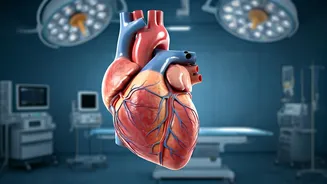The Culprits Identified
The heart surgeon, in this insightful examination, highlights five specific everyday habits that pose significant dangers to heart health. These habits,
often overlooked or underestimated, insidiously contribute to cardiovascular issues, potentially leading to severe complications. The insights offered aim to bring awareness to these often-unnoticed threats, encouraging a proactive approach to heart health. Understanding these five primary risks is the initial step toward fostering a healthier lifestyle and diminishing the risk of heart-related ailments. This revelation serves as a wake-up call, emphasizing that small, consistent changes can yield significant positive effects on heart health. The goal is to empower individuals to make well-informed choices for a stronger, more resilient heart.
Alcohol and Heart Health
The consumption of alcohol is a significant factor in deteriorating heart health. The heart surgeon advises that alcohol is ranked as a 10 out of 10 in terms of the damage it can cause. Excessive alcohol intake can lead to elevated blood pressure, irregular heartbeats (arrhythmias), and weakening of the heart muscle (cardiomyopathy). Moreover, alcohol consumption can increase the risk of stroke. Even moderate alcohol consumption may pose cardiovascular risks, making it crucial to understand individual tolerance levels and consult a healthcare professional. Reducing or eliminating alcohol consumption can significantly benefit the heart, contributing to reduced inflammation and a lower risk of cardiac events. Careful consideration and informed decisions regarding alcohol consumption are essential for maintaining a healthy heart.
The Perils of Vaping
Vaping poses a considerable threat to heart health, rated a perfect 10 out of 10 by the heart surgeon. Vaping products often contain nicotine, which elevates blood pressure and heart rate, placing additional strain on the cardiovascular system. The aerosols inhaled during vaping can also damage blood vessels and increase the risk of blood clots. Studies have linked vaping to a higher incidence of heart attacks and strokes, making it a serious concern for heart health. Avoiding vaping is a critical step in preserving cardiovascular well-being. The long-term effects of vaping are still being studied, but the existing evidence is clear: it presents a significant risk to the heart.
Soda's Sweet Danger
Soda consumption is identified as a risk factor, with a rating of 4 out of 10. The high sugar content in sodas can contribute to weight gain, insulin resistance, and inflammation, all of which are detrimental to heart health. Excess sugar intake is closely linked to increased levels of triglycerides, a type of fat in the blood, which can raise the risk of heart disease. Furthermore, the empty calories in soda provide no nutritional value, contributing to a less healthy diet overall. Reducing soda intake is a straightforward measure that can improve heart health. Opting for water, unsweetened tea, or other healthier alternatives can make a tangible difference in preventing cardiovascular complications.
The Shadow of Sleep Deprivation
Sleep deprivation, another critical factor, is rated as a 10 out of 10. Consistent lack of sleep can disrupt the body's natural rhythms, increasing blood pressure and inflammation, both of which are major risk factors for heart disease. Sleep deprivation can also impair metabolic function, contributing to weight gain and insulin resistance. The cardiovascular system is significantly impacted by sleep patterns, and chronic sleep loss can increase the likelihood of heart attacks and strokes. Prioritizing quality sleep and establishing a consistent sleep schedule can have a positive impact on heart health. Aiming for 7-9 hours of sleep each night is essential for overall health and cardiovascular well-being.
The Burden of Stress
Stress, ranked as an 8 out of 10, is a major contributor to cardiovascular issues. Chronic stress triggers the release of stress hormones, which can elevate blood pressure, increase heart rate, and damage blood vessels. These effects increase the risk of heart attacks and strokes. Unmanaged stress can lead to unhealthy coping mechanisms, such as overeating, smoking, and excessive alcohol consumption, all of which further harm heart health. Incorporating stress-reducing techniques, such as meditation, exercise, or spending time in nature, can significantly reduce the impact of stress on the cardiovascular system. Learning to manage stress is crucial for protecting heart health and improving overall well-being.














